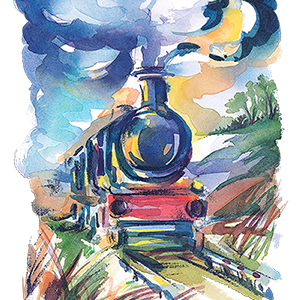Are you working on writing a novel, perhaps your first? Do you plan to finish it, then bring in an editor for help with the final polish? My experience editing dozens of books by first-time novelists suggests you might be making a mistake. Most of the novels I critique are full of serious problems the author had no idea existed. That’s because it’s hard to see the weaknesses in your own writing. Each time I get a manuscript of this sort, I lament the fact that the author didn’t approach an editor early on in the writing, instead of after investing hundreds of hours in something that now must essentially be reconstructed, often from the ground up.
 Often people are told in writing classes that the best way to improve their writing is practice—just write and keep on writing, and your writing will get better. Unfortunately, that’s not always the case. Practicing poor writing actually deepens any bad habits you may have. You get entrenched in your pet writing errors, and every beginning author has these. Perhaps you constantly write dangling participles, or use ten words to say something you could say in two. Maybe you routinely chop essential elements (like prepositions) from your sentences, thinking that makes for tighter writing. Or maybe your plot meanders or your protagonist is annoying, and you write a hundred thousand words of a story no one would ever pay to read.
Often people are told in writing classes that the best way to improve their writing is practice—just write and keep on writing, and your writing will get better. Unfortunately, that’s not always the case. Practicing poor writing actually deepens any bad habits you may have. You get entrenched in your pet writing errors, and every beginning author has these. Perhaps you constantly write dangling participles, or use ten words to say something you could say in two. Maybe you routinely chop essential elements (like prepositions) from your sentences, thinking that makes for tighter writing. Or maybe your plot meanders or your protagonist is annoying, and you write a hundred thousand words of a story no one would ever pay to read.
Writing a Novel: A Case in Point
I just finished critiquing a four-hundred-page novel that is unpublishable, that the author must rewrite and re-structure from the bottom up if she is to have any hope for success. And she was so proud of what she had created, so certain it was excellent. She already had sent it around to several agents, who, of course, passed on it. Had she contacted me when she first began the writing, I could have explained that her protagonist fails to engage because he has no goal and sways with the wind; that the plot lacks tension because story events move horizontally instead of building in significance; and that the overdone narration distances the reader (the solution being more scenes that emotionally draw readers in through dialog, characters’ thoughts, and sensory details). Now I must tell this client the bad news, that would have been so easy to roll with had she heard it at the beginning, when all the problems with the story were just in seed form.
 Trying to fix a novel you’ve already written can be like trying to weed a garden that has gone untended all summer long. Or like building a house without any experience in construction and finding out, after it’s up, that you put the plumbing in backwards or installed the basement on a slant. The problems would have been easy to fix if some skilled person had given you feedback at each stage of your progress, but because that didn’t happen, now you’ve got a real mess.
Trying to fix a novel you’ve already written can be like trying to weed a garden that has gone untended all summer long. Or like building a house without any experience in construction and finding out, after it’s up, that you put the plumbing in backwards or installed the basement on a slant. The problems would have been easy to fix if some skilled person had given you feedback at each stage of your progress, but because that didn’t happen, now you’ve got a real mess.
A Better Alternative
Unlike authors who send me completed first novels, other clients use me as a coach and sounding board on the novel they’re currently writing. We discuss the story together in the planning stage, then touch base at intervals, whenever they’ve written a patch they’d like me to look at. These writers’ skills are growing because (a) flaws get nipped in the bud before they become a habit, (b) they have a sound story plan, a scaffold on which they can build a captivating novel, and (c) they’re learning tools and strategies that elevate their writing. This saves hundreds of hours of rewrite time. And it saves writers from the discouragement of learning that something they invested months or years of their life in, is riddled with serious flaws and must be completely redone. When their story is complete, typically these authors can move directly to a line edit (a substantive edit), bypassing the need for an expensive critique.
So I am a big advocate of developmental editing, which (despite the misuse of the term so prevalent today) actually means consulting with a professional fiction editor when your novel is in the planning stage—or at least long before you’ve written much of the story.
 And here’s another suggestion I give to beginning authors: write a few short stories before tackling that idea you have for a novel. The structure and requirements of story writing are essentially the same, whether your story is long or short, so it’s a great way to cut your teeth on fiction writing. Then, if you think you’ve created something of quality, try sending it around to some of the magazines like Ploughshares, Tin House, or Glimmer Train Stories that publish outstanding short fiction. Or send it to a magazine that specializes in commercial fiction matching your particular genre. (If you need some direction finding short story magazines on the lookout for new writers, check out this Writer’s Digest article.)
And here’s another suggestion I give to beginning authors: write a few short stories before tackling that idea you have for a novel. The structure and requirements of story writing are essentially the same, whether your story is long or short, so it’s a great way to cut your teeth on fiction writing. Then, if you think you’ve created something of quality, try sending it around to some of the magazines like Ploughshares, Tin House, or Glimmer Train Stories that publish outstanding short fiction. Or send it to a magazine that specializes in commercial fiction matching your particular genre. (If you need some direction finding short story magazines on the lookout for new writers, check out this Writer’s Digest article.)
Test Yourself
The results will demonstrate whether you’ve mastered the technique of fiction writing well enough to tackle a novel. And getting published in a respected magazine will pave the way to finding an agent when your book is ready. Agents peruse the better journals looking for gifted writers, and reach out from their side if they feel they’ve discovered a new talent. Even if an agent does not personally contact you to inquire whether you’ve got a novel in the works (yes, they do this!), publication in a magazine will help your career. If your query can state that you’ve had a short story published, agents will be more interested in your book manuscript.
By contrast, if your short story gets passed on by magazine after magazine, you can assume it probably isn’t up to publication standards. That indicates you need to bring in the help of a qualified writing coach/fiction editor to help you find the blind spots in your writing and story construction. Once you can craft a compelling short story, you’ll have the basic skills required to craft a compelling novel.
Three Common Misconceptions
 Perhaps you’re in the midst of writing your novel and are thinking, “I already know it’s good, because my friends [or daughter or grandmother] have seen it, and they say it’s fantastic.” Think again! Almost every author who ever sent me an ailing manuscript said their friends told them it was wonderful. Friends say things like this because they love us. They may not want to hurt our feelings, or they may be so biased in our favor that we could write pages of the alphabet over and over and they would be impressed. Never take the opinion of friends or family as a reliable assessment of your writing. Get an evaluation by a professional.
Perhaps you’re in the midst of writing your novel and are thinking, “I already know it’s good, because my friends [or daughter or grandmother] have seen it, and they say it’s fantastic.” Think again! Almost every author who ever sent me an ailing manuscript said their friends told them it was wonderful. Friends say things like this because they love us. They may not want to hurt our feelings, or they may be so biased in our favor that we could write pages of the alphabet over and over and they would be impressed. Never take the opinion of friends or family as a reliable assessment of your writing. Get an evaluation by a professional.
Interestingly, the author I spoke of who wrote the troubled novel is a newspaper journalist by profession. This demonstrates the gap that exists between nonfiction prose and fiction writing. Aspiring authors sometimes mistakenly assume the skill set is the same, that because they have experience producing reports, articles, or academic papers, they are ready to plunge into writing a novel. Not so.
Another misconception among first-time novelists is that if they have a great premise, they’re going to have a great book. But no matter how wonderful the story is in your head, if you can’t translate that vision into a tale that holds together as a well-crafted novel, people won’t want to read it.
Be Savvy
 So if you’re contemplating writing a novel, think twice before launching into hundreds of hours of work on the project. Consider trying your hand at writing short fiction first. And when you’re ready to tackle your magnum opus, consider getting a qualified fiction editor on board at an early stage, rather than at the end. It will cost you about the same dollar amount in the long run and will save you loads of work. It will also save you from practicing and reinforcing the unrecognized flaws in your story writing.
So if you’re contemplating writing a novel, think twice before launching into hundreds of hours of work on the project. Consider trying your hand at writing short fiction first. And when you’re ready to tackle your magnum opus, consider getting a qualified fiction editor on board at an early stage, rather than at the end. It will cost you about the same dollar amount in the long run and will save you loads of work. It will also save you from practicing and reinforcing the unrecognized flaws in your story writing.
Jessi Rita Hoffman … book editing by an industry professional

2 Comments on “Think Twice Before Writing a Novel”
So true. The first sentence from an agent was “re-conceptualize the whole novel.” This after two years of writing and rewriting a 400 page opus. Now, over a year later and a complete sea-shift, including five major rewrites, we’re ready to go. Problems with the first novel including pacing, confusing details, uninvolved protagonist. “Let him feel, not just observe.”
Thanks for your great blog. It’s been a major help in many ways.
Tom, yes, it’s only too true. I’ve seen this scenario with so many aspiring authors. Glad to hear you got past your difficulties and now have your novel on solid ground. Thanks for your comment.
Jessi